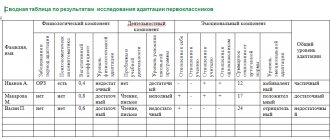There is a full-time psychologist in almost every school, but the percentage of students who voluntarily turn to him for help is extremely small: this specialist is often perceived by children not as a potential confidant, but as a person who comes to lessons once a year and conducts strange tests. What actually includes the functions of a school psychologist, why parents should maintain contact with him and whether teachers should have basic knowledge in the field of psychology - we’ll figure it out together with experts and teachers from the Tutoring Association.
The activities of a school psychologist are usually carried out in two areas:
- Diagnostics of the intellectual sphere
- Diagnostics of the personal sphere
Diagnosis of the intellectual sphere involves identifying difficulties in mastering material, which, of course, do not always indicate that the child is lagging behind in development. But if a problem exists, the sooner parents and teachers begin to solve it, the better. When diagnosing the personal sphere, it may turn out that, for example, a child has difficulty adapting to school life, and he needs the help of an adult in this process.
“There is no universal psychologist,” says educational psychologist Valeria Gennadievna. “Everyone has their own specialization and their own methods. For example, I use projective techniques - mainly drawing ones. Firstly, they can be used during group classes, and secondly, if in a dialogue a person can tell a lie, then a drawing is a conversation with our unconscious. As for the cases that I have encountered: for example, it happens that a child has great difficulty mastering written speech. Teachers are not always able to understand that the student is not just lazy or does not know the rules, but that he has dysgraphia, that is, the inability to master writing with the normative development of intelligence. It is within the competence of a psychologist to identify the problem, tell teachers about it and notify parents.”
Thus, the activities of a school psychologist are carried out in three directions: work with children, work with parents, work with teachers. Let's consider each of these areas separately.
Profession: educational psychologist
A teacher-psychologist is an employee of an educational institution who monitors the social adaptation of students, works to correct deviant behavior of children, and takes measures aimed at preventing psychological deviations.
The job responsibilities of a teacher-psychologist at school include maintaining students’ personal files, monitoring children, and taking measures to eliminate problem situations. The personal qualities of a psychologist play a big role in the organization of his work. Mutual understanding, the ability to listen and make decisions are mandatory qualities that an educational psychologist must have.
The personal qualities of a psychologist must correspond to the position held. A child is more likely to make contact if the educational psychologist has the following qualities:
- communication;
- friendliness;
- justice;
- tolerance;
- modernity;
- intelligence;
- optimism.
Not everyone can become a talented specialist in this field, since the productivity of a teacher-psychologist at school depends on the personal qualities of the person himself.
Teachers
It seems that a psychologist is assigned to the school only to work with students and monitor their psychological health. However, a favorable atmosphere in school depends on both the calmness of the students and the calmness of the teachers. Moreover, in this sense, the latter are entrusted with even more responsibility.
Photo source
“Let’s make it clear that anyone can turn to a school psychologist for advice: a child, a parent, a teacher, even a representative of the school administration,” says Valeria Gennadievna. “Moreover, the question does not necessarily have to concern the school agenda: problems of a personal nature also happen to teachers. Another thing is that they are often wary of the psychologist, they do not like it when someone interferes in the learning process, and the psychologist inevitably has to do this. As a result, a kind of confrontation begins, and, of course, in such a situation one can hardly expect that the teacher will readily come to ask the psychologist for help. The exceptions are, perhaps, acute conflict situations in the classroom, which the teacher simply cannot cope with on his own.”
Why is conflict resolution specifically within the competence of a psychologist? There are several reasons for this:
- The teacher, no matter how hard he tries to abstract himself from the situation, is still at the center of the conflict. The psychologist plays the role of an outside observer;
- Even if a teacher is confident that he has no favorites in the class, he may still unconsciously make decisions in favor of students he likes more. The psychologist is impartial;
- A psychologist, regardless of his specialization, as a rule, is better aware of the methods of resolving disputes: alas, when receiving higher education, not all teachers pay close attention to the psychology of pedagogical activity.
“I believe that teachers of general education institutions should have basic knowledge and skills at least in such areas of psychology as: general psychology, developmental psychology, educational psychology,” Yulia Olegovna is sure. “Such knowledge will help the teacher competently and more effectively organize training and education and the development of the child, taking into account the age, physiological and individual characteristics and capabilities of the child. But not only. In the modern pedagogical process, every teacher or any specialist working with a child simply needs to undergo personal therapy. Personal consultations with a psychologist or psychotherapist will allow teachers to avoid emotional burnout, as well as work through their personal conflicts and ambitions, which will contribute to more successful communication with children and colleagues.”
Job responsibilities of a teacher-psychologist
A specialist can hold this position only if he has a higher or secondary specialized education in the field of “Pedagogy and Psychology”. The Federal State Educational Standard, or Federal State Educational Standard, for a teacher-psychologist at school is regulated by the Ministry of Education and Science of the Russian Federation.
The functional responsibilities of a teacher-psychologist at school are not limited to resolving conflict situations and working with problem children.
We list the main job responsibilities of a psychologist:
- Providing favorable conditions for the development, learning and socialization of students.
- Identifying the causes of problematic situations between students.
- Providing psychological assistance to children who need it.
- Participation in the development of developmental and correctional programs.
- Control of the educational process.
- Consulting teachers and parents on issues of development, socialization and adaptation of children.
- Analysis of children's creative and educational achievements and their academic performance.
- Assessing the effectiveness of teachers.
This is only a small part of the responsibilities of an educational psychologist. A complete list is prescribed in the job descriptions when hiring a specialist for this position.
Educational psychologist program
The work program is drawn up for one academic year in accordance with the requirements of the Law “On Education”. Each program is developed with a specific purpose. To achieve the goal, a list of tasks is assigned, the implementation of which leads to the desired result.
Each program has several areas of work, and the activities of a teacher-psychologist at school are divided into the following areas: correctional and developmental, psychological and pedagogical, analytical, counseling and education. For each category of activity, a detailed action plan is drawn up. The means and methods that must be applied to achieve the goal are listed.
The predicted performance results for each category of students are indicated. The program is compiled based on the individual and age characteristics of students. The program should include planning work with students’ parents, taking into account the individual characteristics of families, identifying dysfunctional, single-parent families. The responsibility of a teacher-psychologist at school is also to monitor the upbringing of a child in the family.
Psychological education
In order for socialization and personal development to proceed harmoniously, it is necessary to create all the necessary conditions for this. In particular, take care of the formation of positive attitudes towards psychological assistance to the child among parents, teachers and the children themselves. In most cases, parents who do not have knowledge in the field of child psychology do not know how to behave when conflict situations arise. Sometimes it happens that adults aggravate the situation with their reaction or incorrect behavior. The responsibilities of a teacher-psychologist at school include conducting classes on psychological education of teachers and parents at regular intervals. If conflict situations arise, the psychologist must begin individual work with the student and his parents.
School psychologist
A school psychologist is a psychologist who works in a school.
The goal of the school psychological service is to optimize the educational environment in order to create conditions for the harmonious development of students’ personalities.
Why do we need a psychologist at school?
The psychologist provides psychological and pedagogical support of the educational process in order to ensure the normal development of the child (in accordance with the norm of development at the appropriate age).
The functions of a school psychologist include: psychological diagnostics; correctional work; counseling parents and teachers; psychological education; participation in teacher councils and parent meetings; participation in the recruitment of first-graders; psychological prevention.
Psychological diagnostics includes conducting frontal (group) and individual examinations of students using special techniques. Diagnostics are carried out at the preliminary request of teachers or parents, as well as at the initiative of a psychologist for research or preventive purposes. The psychologist selects a methodology aimed at studying the abilities and characteristics of the child (group of students) that interest him. These can be techniques aimed at studying the level of development of attention, thinking, memory, emotional sphere, personality traits and relationships with others. The school psychologist also uses methods to study parent-child relationships and the nature of interaction between the teacher and the class.
The data obtained allow the psychologist to build further work: identify students in the so-called “risk group” who need remedial classes; prepare recommendations for teachers and parents on interaction with students.
In connection with diagnostic tasks, one of the psychologist’s tasks is to draw up an interview program with future first-graders, conducting that part of the interview that concerns the psychological aspects of the child’s readiness for school (the level of development of volition, the presence of motivation to learn, the level of development of thinking). The psychologist also gives recommendations to parents of future first-graders.
Corrective classes can be individual or group. During the process, the psychologist tries to correct undesirable features of the child’s mental development. These classes can be aimed both at the development of cognitive processes (memory, attention, thinking), and at solving problems in the emotional-volitional sphere, in the sphere of communication and the problem of self-esteem of students. The school psychologist uses existing lesson programs and also develops them independently, taking into account the specifics of each specific case. Classes include a variety of exercises: developmental, gaming, drawing and other tasks - depending on the goals and age of the students.
Consulting parents and teachers is work on a specific request. The psychologist acquaints parents or teachers with the diagnostic results, gives a certain prognosis, and warns about what difficulties the student may have in the future in learning and communication; At the same time, recommendations are jointly developed for solving emerging problems and interacting with the student.
Psychological education consists of introducing teachers and parents to the basic patterns and conditions for the favorable mental development of a child. This is carried out through consultations, speeches at pedagogical councils and parent-teacher meetings.
In addition, at pedagogical councils, the psychologist participates in making decisions about the possibility of teaching a given child according to a specific program, about transferring a student from class to class, about the possibility of a child “stepping over” through a class (for example, a very capable or prepared student can be transferred from first grade immediately to third).
All of the above functions of a school psychologist make it possible to maintain at school the psychological conditions necessary for the full mental development and formation of the child’s personality, that is, they serve the purposes of psychological prevention.
The work of a school psychologist also includes a methodological part. A psychologist must constantly work with literature, including periodicals, in order to track new scientific achievements, deepen his theoretical knowledge, and become familiar with new techniques. Any diagnostic technique requires the ability to process and summarize the data obtained. The school psychologist tests new methods in practice and finds the most optimal methods of practical work. He tries to select literature on psychology for the school library in order to introduce teachers, parents and students to psychology. In his daily work, he uses such expressive means of behavior and speech as intonation, posture, gestures, facial expressions; is guided by the rules of professional ethics, the work experience of himself and his colleagues.
Questions for which you can and should contact a school psychologist:
1. Difficulties in studying
Some children do not study as well as they would like. There could be a lot of reasons for this. For example, not a very good memory, distracted attention or lack of desire, or maybe problems with the teacher and a lack of understanding why all this is needed at all. During the consultation, we will try to determine what the reason is and how to fix it, in other words, we will try to find what and how needs to be developed in order to learn better.
2. Relationships in the classroom
There are people who easily find contact with others and easily communicate in any company, even unfamiliar ones. But there are, and there are also a lot of them, those who find it difficult to meet people, difficult to build good relationships, difficult to find friends and just feel light and free in a group, for example? in class. With the help of a psychologist, you can find ways and personal resources, learn techniques for building harmonious relationships with people in a variety of situations.
3. Relationships with parents
Sometimes it happens that we lose the common language and warm relationships with our closest people - our parents. Conflicts, quarrels, lack of mutual understanding - this situation in the family usually brings pain to both children and parents. Some find solutions, while others find it quite difficult to do so. The psychologist will tell you how to learn to build new relationships with your parents and learn to understand them, and how to make your parents understand and accept you.
4. Choosing a life path
Ninth, tenth and eleventh grades are the times when many people think about their future profession and, in general, about how they would like to live their lives. If you're not sure? Whichever path you want to go, there is always the opportunity to go to a psychologist. It will help you realize your dreams, desires and goals, evaluate your resources and abilities, and understand (or get closer to understanding) in which area(s) of life you want to be realized.
5. Self-government and self-development
Our life is so interesting and multifaceted that it constantly poses a lot of challenges for us. Many of them require considerable effort and the development of a wide variety of personal qualities, skills and abilities. You can develop leadership skills or argumentative skills, logical thinking or creativity. Improve your memory, attention, imagination. You can learn to manage your life, set goals and achieve them effectively. A psychologist is a person who owns the technology for developing certain qualities, skills and abilities and will be happy to share this technology with you.
Websites dedicated to the work of a school psychologist
- School psychologist Marina Georgievna Dyatlova - a selection of necessary documents, useful games and exercises.
- Encyclopedia of a school psychologist
Psychological diagnostics
At this stage, the psychologist diagnoses the psychological state of students. Reveals the characteristics of the emotional state, the level of development, and in some cases the degree of social neglect or the presence of mental disorders. Diagnostic testing is carried out in different variations. This could be a test, an event, a group lesson, etc. An educational psychologist processes the information received during the diagnosis and identifies a risk group. Such a group may include children who do not have friends among their peers, students who create conflict situations, and children with weak emotional stability. Any deviation from the norm may be a reason to begin individual work with the child and his parents.
Ethics and professionalism
Security and confidentiality—the work of every professional psychologist, including school psychologists, is built on these principles. That is why information about children, teachers and parents obtained in the process of work must be stored in a special safe. Only the psychologist himself has access to it - this is the rule of the professional Code of Ethics. And, of course, the specialist can use this information only for his own work: it is prohibited to disclose it to third parties. But there is an exception. If a psychologist finds out about something that could harm other people - for example, the preparation of a crime - he is obliged to report it to law enforcement agencies.
A psychologist is an impartial figure. This means that a specialist must consider the situation from different angles, without initially taking one of them. Impartiality eliminates the desire - sometimes unconscious - to resolve the conflict in someone else's favor.
To start working with a child, you need to be able to create a trusting atmosphere. This is one of the basic professional skills of a school psychologist: it is necessary to establish contact with even the most difficult clients (in our case, a schoolchild). The psychologist is obliged to communicate the results of any research that takes place during the work to the child. These may be identified abilities that make sense to develop, or points that are worth working on so that they do not develop into a problem. The latter includes training memory and communication skills, learning to correctly express negative emotions.
Psychological correction
Once the problem is identified, the behavior correction stage begins. The educational psychologist must prepare a program to correct the existing deviation. The activities of specialists and teachers should be carried out in conjunction with the activities of parents. A positive result of psychological correction will be the complete correction of deviant behavior.
Correction of deviations is carried out individually or within a group. In 1st grade, for example, group correction is practiced, which allows children to get to know each other better and unite into one team. This event is held in the form of a game.
Corrective work is aimed at children who have the following deviations from normal behavior:
- hyperactivity;
- aggression;
- excessive anxiety;
- excessive shyness;
- presence of constant fear;
- attention deficit;
- poor memory;
- difficulties in mastering the material;
- difficult thinking.
If the deviation manifests itself very acutely, cannot be corrected, and at the same time there is a complex failure of the child within the framework of the school curriculum, then the psychologist should raise the question of transferring the student to a specialized educational institution.
Psychological prevention
Includes a set of measures aimed at creating favorable conditions for development, social adaptation and learning. An educational psychologist must prevent deviations or problems that a child may have when communicating with peers or teachers.
Preventive measures may include the following behavioral tactics:
- friendliness in communicating with children;
- teaching correct behavior through the personal example of an adult;
- showing greater interest and attention towards hyperactive children;
- providing a state of rest for children who are prone to fatigue;
- gradual development of self-control skills in children.
Not only school staff, but also parents and relatives of the child should show a loyal attitude towards children. Classes on psychological prevention are conducted both within the class and between parallel classes.
Mom, dad - to the board!
When I tell my parents about my work at the beginning of the school year, I emphasize that my “challenge” does not mean “everything is bad.”
When can a psychologist invite you for a consultation?
- The child's behavior or emotional state has changed in a negative way. The task is to find out the cause and help in a timely manner. Children have stressful situations that are difficult for them to cope with, neuroses, fears, obsessions, and depression. Early diagnosis and timely assistance are very important so that the situation does not worsen.
- The child demonstrates behavioral traits that make it difficult for him to be in a group: physical or verbal aggression, shyness, deceit, theft, low self-control. Sometimes, when parents are told about what is happening, they “don’t believe it” (some sincerely, some falsely). But the named problem becomes an urgent task. A conversation with parents allows you to understand what exactly is happening and gives you the opportunity to act together.
- Report diagnostic results. It can be something that needs to be “worked on” or something that is a child’s ability that is worth developing. Often a psychologist can offer help in the form of a series of sessions with the child. These can be classes to develop thinking, memory, attention, imagination (everything that helps to learn), to develop communication abilities, to overcome unwanted manifestations (control of aggression), as well as classes with talented children.
- If the child has an adaptation period. A psychologist can tell you how to join this particular team, and, having learned about the child’s characteristics, can help him “on the spot.”
Psychologist's work with parents of students
If situations occur in the child’s family that provoke any deviations, then the educational psychologist is obliged to conduct a conversation with the student’s parents. Without an integrated approach, it will not be possible to correct deviant behavior. The psychologist should pay special attention to children from disadvantaged families. Problematic parents are not always ready to interact, so it is necessary to choose appropriate communication tactics and outline the arguments and prospects for effective cooperation.
The psychologist must actively interact with parents and help them resolve controversial situations with the child. Parenting counseling can take place on an individual basis, if necessary. The parent's behavior tactics should not differ from the behavior patterns of teachers at school. Parents should consider the process of cooperation with a school psychologist as an opportunity to replenish their knowledge in the field of child psychology and pedagogy. A psychologist should not overload parents with work, this may scare them away. Interest in such cooperation will quickly disappear.
Parents: they don’t want to and are afraid
It’s not uncommon for parents to discuss the topic “What can he do?” From the devaluing pole “can’t do anything” to the omnipotent “very much.” It would seem that the services of a school psychologist for parents are free, so take advantage! Ask your questions, get answers. Finally, go and meet them and form your opinion not about psychologists “in general,” but about a specific person in a specific place. But for some reason, free is still considered synonymous with low quality. But this is not true at all! Many of my colleagues are not just competent, but very smart, constantly improving their training and loving their job.
Parents, in my experience, fall into three main categories:
- 1. Partners.
They are not afraid of the psychologist, they talk to him as equals from the position of jointly helping the child. Often they themselves turn to a specialist. The request can be problematic, simply informational (“tell us how you see it”), or developmental (“how to act to show your abilities; teach how to answer at the board; better find a common language with classmates”). Working with such parents is a pleasure, and the child’s progress is always noted quite quickly. Sometimes they come at the invitation of a psychologist, but they also make contact well. - 2. Listeners.
These parents never come themselves. Sometimes they don’t want to “wash dirty linen in public”; some are too busy or careless to pay attention to the problem; others believe that as long as they are not called, everything is fine. Their contact with the psychologist is formal, they listen, they may even write down recommendations. But, as the development of the situation shows, most likely they are not used. It is these listeners who claim that they “went to a psychologist, but he couldn’t help.” - 3. Runners.
No matter how much you invite, they don’t come. Sometimes signing up over and over again and not showing up, sometimes simply ignoring. In case of a serious situation, you can only meet them at a teachers' meeting. I urge my colleagues to keep evidence that these parents were repeatedly invited to counseling that could help.
Psychologist's work in primary school
Starting school is a very important stage for a child and his parents. It is at school that the child begins to actively develop and adapt to society. Relationships with peers are built on the basis of a certain scheme, which is worked out by teachers and parents. Before a child enters first grade, a psychologist must determine readiness for school.
At the stage of starting children's education, the psychologist's task will be to adapt the child among his peers and teachers. Gifted children with a high level of development need to be given special attention so that they do not lose interest in learning. Students who have difficulty mastering the school curriculum need to be provided with timely assistance. Monitoring children's school progress is one of the responsibilities of an educational psychologist at school.
If a psychologist observes inappropriate behavior by children or teachers, he must respond immediately. The activities of a teacher-psychologist in elementary school are based on the characteristics of the perception and development of children of a given age. A trusting, collaborative relationship should develop between the child and the teacher.
Ethics is not an empty phrase
The most important ethical principles in the work of any psychologist are “do no harm” and “do not disclose.” Therefore, parents can fully count on the fact that their child will be helped at the maximum, and at a minimum will not be harmed, and will not tell what is not worth telling. And this is where the question arises about what information the psychologist can convey further (to teachers, administration) and what information cannot. There is no doubt that some information will be transferred.
There are several reasons for this. When a certain situation develops around a child, the idea of a three-way connection “child-parent-teacher” works. Often the administration becomes another party. But in order for this system to work and adequate support to come from all sides, it may be necessary to transfer some information, for example, from a psychologist to a teacher (observation or diagnostic results), from a parent to a teacher (about a difficult life situation, about the features of an approach to education), from a teacher to to the parent if they have communication difficulties.
For example, a student has become withdrawn and studies worse. Teachers do not understand, students react differently, and a careless word only makes the situation worse. A psychologist can talk to the child. And it turns out that he recently survived an attack by classmates, which he was ashamed to report. Next, it would be correct to inform your parents about this situation, and work with them on the topic of what to do next. The class teacher and the school ombudsman must also be notified.
At all these stages, information becomes a necessary tool. And even if parents demand not to tell either teachers or the ombudsman, this will be an impossible demand. You can, of course, not name the victim, but experienced teachers, as a rule, are able to add 2+2. And here the psychologist is like a tightrope walker - he needs to manage to maintain the child’s trust, contact with parents, but also act for the benefit of other children in order to stop school bullying.
Sometimes it is useful for teachers to provide information about the child's characteristics in order to maintain his motivation and prevent incorrect conclusions. For example, a teenager with schizoid traits (withdrawn, difficult to speak in public, not joining in on social events) is often mistaken for being lazy. Timely and correct information can help build an adequate image and approach - for example, do without calls to the board and without insistence on participating in the school KVN.
But a real professional psychologist will never allow himself to have “friendly chat” with teachers or administration about the child’s personality or family situation. As a rule, if some information was given, the specialist will be able to fully justify why it was done. Although here, of course, there is a very, very thin rope, sometimes over an abyss.
Carrying out extracurricular activities
An extracurricular activity, depending on its specifics, may have different goals. The educational psychologist selects tasks or games that can provide the necessary information about children. In this case, the purpose of the event will be diagnostics, identification of problematic situations in the team, and observation of children’s communication. Team assignments are suitable for this purpose. The guys will immediately identify several leaders who will lead the teams.
If children already know each other, but there are conflict situations between certain representatives of the class, then the purpose of the extracurricular activity will be to unite the team and form friendly and trusting relationships between students. In this case, the parties to the conflict must be on the same team. It is necessary to create a situation that will encourage children to cooperate.
The program of an educational psychologist at school should include various activities. They are held throughout the school year in all classes.
Analysis of the work of a psychologist at school
At the end of the academic year, a detailed report is compiled. An analysis of the work of a teacher-psychologist in a school should include conclusions about the fulfillment of set goals and objectives. The report lists the activities that were carried out by the psychologist, provides a list of problem children, and also describes in detail the progress of work with them. In the report, the psychologist indicates the names of the students with whom individual lessons were conducted.
The analysis includes a psychologist's conclusion about the readiness of high school students to choose a profession. A list of academic performance for each grade and a list of career guidance for students in grade 4 are compiled. This is done if the school provides career-oriented classes. The prospects for children's development for the next school year are also indicated.










